The Independent's journalism is supported by our readers. When you purchase through links on our site, we may earn commission.
Coach versus train: Which wins out on a flight-free odyssey to southern Spain?
Taking on the terrestrial travel challenge, flight-free travel editor Helen Coffey weighs the pros and cons on a race across the Continent


Your support helps us to tell the story
From reproductive rights to climate change to Big Tech, The Independent is on the ground when the story is developing. Whether it's investigating the financials of Elon Musk's pro-Trump PAC or producing our latest documentary, 'The A Word', which shines a light on the American women fighting for reproductive rights, we know how important it is to parse out the facts from the messaging.
At such a critical moment in US history, we need reporters on the ground. Your donation allows us to keep sending journalists to speak to both sides of the story.
The Independent is trusted by Americans across the entire political spectrum. And unlike many other quality news outlets, we choose not to lock Americans out of our reporting and analysis with paywalls. We believe quality journalism should be available to everyone, paid for by those who can afford it.
Your support makes all the difference.“I’m sorry – are you mad?”
It’s nothing short of alarming when Simon Calder, The Independent’s illustrious travel correspondent, says this in response to your holiday plans. This is a man who has been known to travel across the Turkish border in the back of a strange man’s windowless van. The man who, as planes were being grounded the world over at the start of the pandemic, hitchhiked across the Middle East until he made it onto the last flight into Yemen. The man whose wildly improbable travel stories regularly leave my jaw on the floor, such is their high drama.
When Simon Calder questions the sanity of your travel itinerary... Well, it’s perhaps time to stop and think about what you’ve done.
His disbelief related to my proposed trip down to southern Spain, not far from the city of Algeciras, for a friend’s wedding in May. For most people, such a trip would involve a swift, cheap flight into Malaga or across the border in nearby Gibraltar; no muss, no fuss. For me, it was altogether more complicated.
Read more on train travel:
I haven’t boarded a plane since autumn 2019 – unrelated to Covid, I decided to try travelling flight-free because of the climate emergency. I initially thought this experiment would be short-lived, but three-and-a-half years later here I am, still opting to stay grounded to reduce my impact on the planet.
Most of the time, one of the biggest incentives is the journey itself, and how enjoyable it is to take your foot off the gas and embrace the slow travel experience. But this time, I had a set amount of annual leave and a specific date I needed to be somewhere for: namely, to watch my friends finally get hitched on 23 May. And that’s how I found myself embarking on a nearly 48-hour – two full nights, two full days – coach trip from London to Algeciras. Understandable, really, that Simon queried whether I was quite alright in the head.
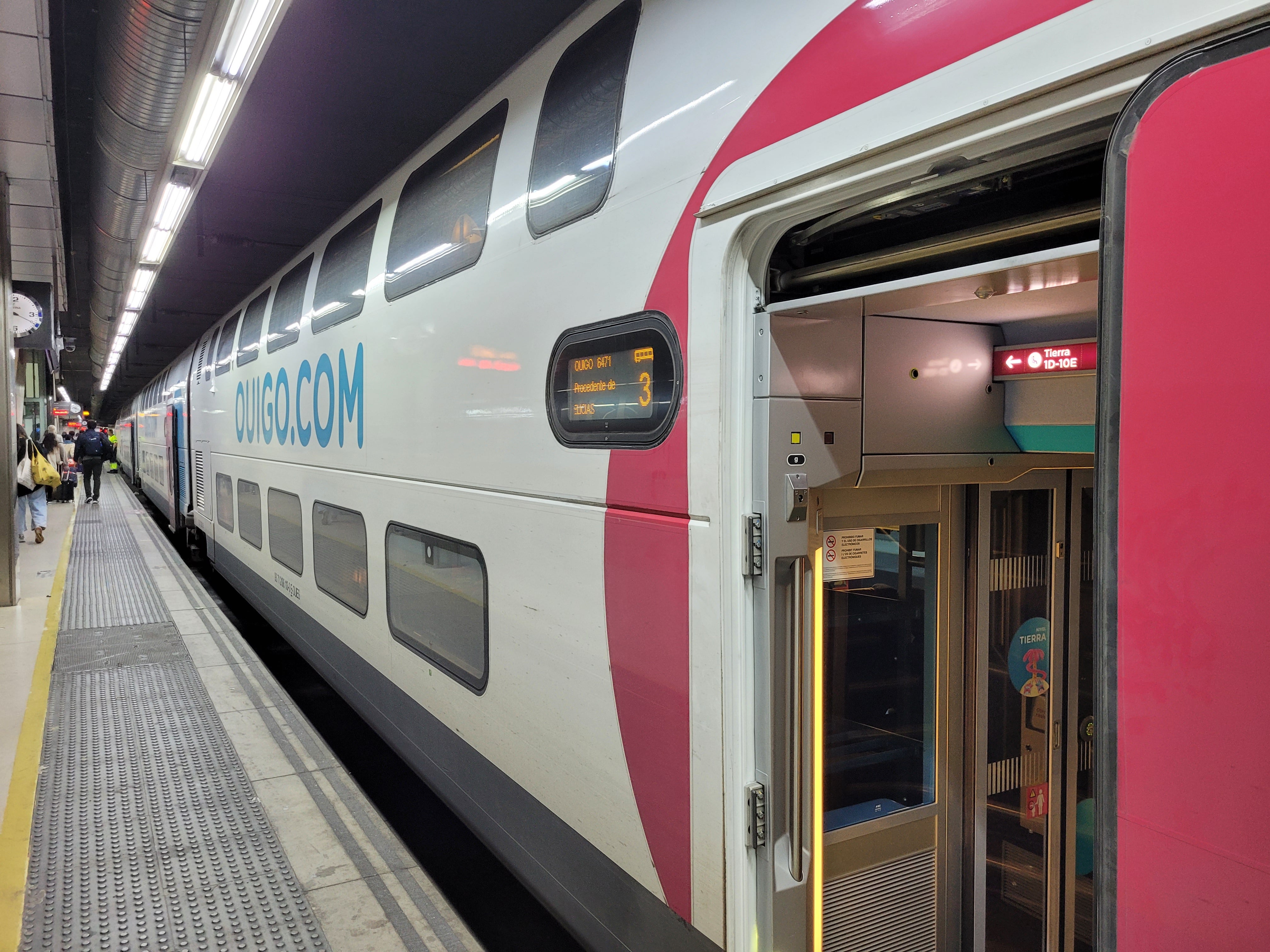
What partly prompted my punishing transport plans was price. Much of the time, when I tell people I’ve sworn off flying to reduce carbon emissions, they say they’d love to do the same – but that it’s simply too expensive. I can hardly blame them for this attitude; analysis by Which? back in 2021, for example, found that train fares on popular UK routes were 50 per cent more expensive than plane fares, despite rail journeys producing 80 per cent fewer CO2 emissions.
On this trip, I was determined to find a cheaper alternative as well as rail travel and then compare the two. Low-cost coaches one way, pricier but more comfortable trains the other. Which would win out? Buckle up and let’s find out...
Coach
Total time: 46 hours
Route: London-Brussels-northern Spain-Algeciras
Cost: From £112
Comfort: 4/10 (London-Brussels: 6/10)
This journey was the one that so stunned Mr Calder, and for good reason. Only a mad(wo)man would attempt it. It’s my own fault: I chose to do the entire journey in one almost literal sitting, without breaking it up or spending the night somewhere. What was astonishing, though, was that it was possible – clearly, it would have been more comfortable to overnight somewhere in a hotel, but I didn’t have to. A boon for the time-poor (and money-poor) traveller.
I opted to use FlixBus, the Germany company that’s exploded in popularity over the last decade, with its extensive network of cheap, efficient, inter-city coaches operating all over Europe, plus across North America and Brazil. I found I could set off on the Friday night after work, catch the overnight coach from London to Brussels, and connect to an onward service to Spain.
I didn’t know it at the time, but this first stint was to be the best bit of the journey. The seats were wide and comfortable with leg room an airline passenger could only dream of. There was even a tray table to rest my phone on while watching a film and, sweet joy, the toilet was functioning. (In hindsight, this last point set the bar unfortunately high.)
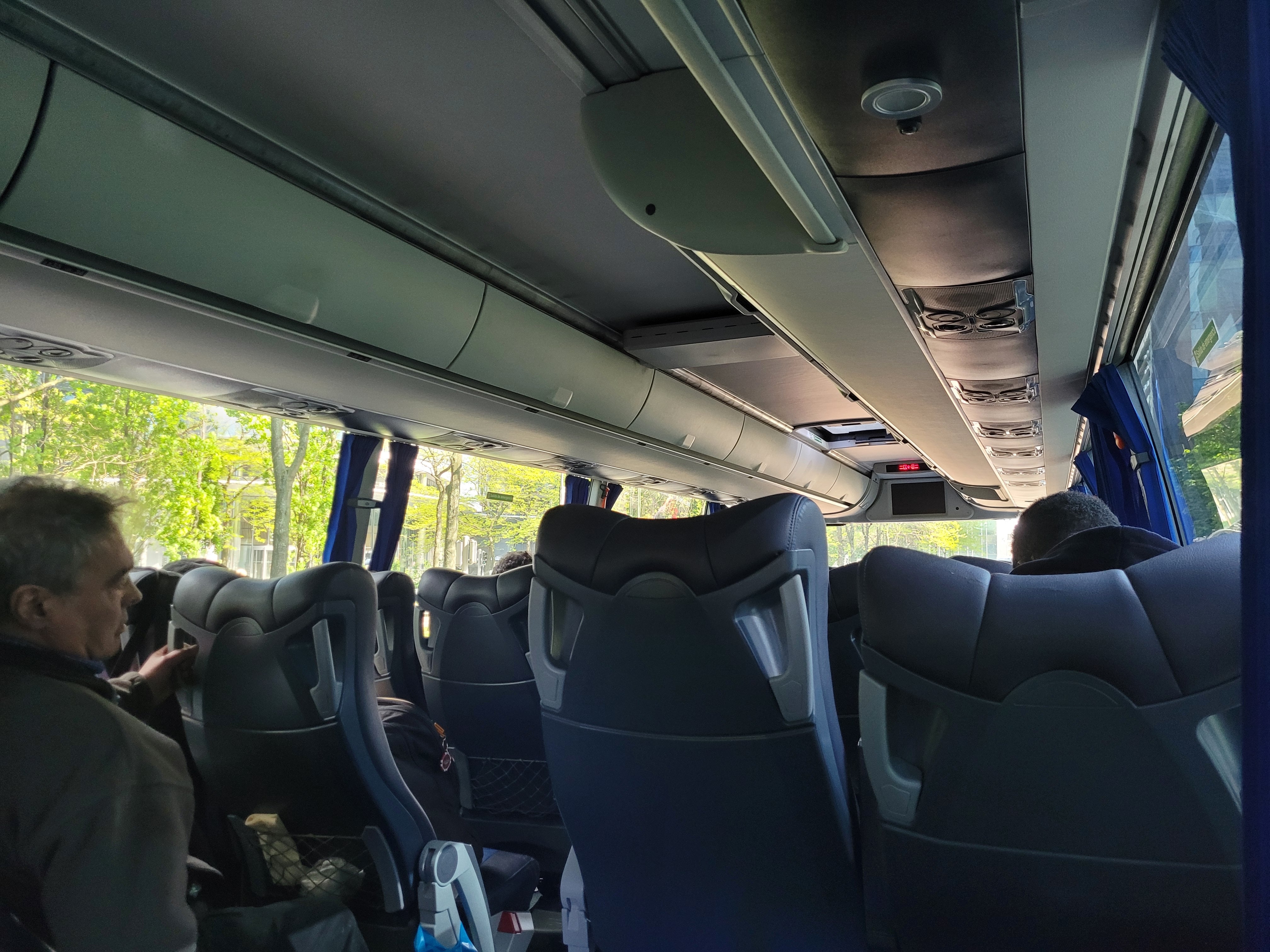
The only real downside of coach No 1 had nothing to do with FlixBus, in fact, and everything to do with Brexit: once we arrived at Folkestone to get on the Eurotunnel, not long before midnight, we were forced to all shuffle off the bus not once but twice to have our passports individually checked and stamped. Huzzah for the hard border! Hurrah for taking back control!
Mercifully, there remained a good six hours in which to sleep, or at least attempt to, until we hit the Belgian capital. Here, a superior travel pillow is your friend – on the advice of a colleague I panic-splurged on a Trtl, which has a special design that holds your head up. Money very well spent.
From Brussels, I would board another coach all the way to a stop mysteriously referred to simply as “International Interconnection Hub”, in an undisclosed location in northern Spain. But not before I’d spent four hours in Brussels-North train station, changing and brushing my teeth in the toilet, enjoying breakfast brioches brought from home, and treating myself to a coffee from the only establishment that was open (McDonald’s).
The next coach was not far off a full 24 hours: all day, all night. When I look back, it’s all a bit of a blur. I read, flicked through magazines, ate snacks, rewatched three seasons of Catastrophe, contemplated my new crush while staring wistfully out the window... Somehow, the journey passed pleasantly and, even more surprising, swiftly enough. (PSA: while all coaches had working plug sockets to keep devices charged, none of them had wifi; download before departure if you want films and series to form part of your in-journey entertainment.) Unlike the London leg, this coach wasn’t bringing anything special to the table. It was a regular vehicle: servicable, clean, temperate. But no extra legroom; no special recline; no tray table. Yet for all that, I still managed a good few hours’ sleep.

The only major stumbling block won’t come as a shock to anyone who has spent much time on coaches, but it certainly surprised me, if only for the all-encompassing nature of the malfunction. The toilet onboard no longer had any soap after my first visit. To be expected, one might argue. But pretty soon it was also without toilet paper, water, the capacity to flush or a working light. By which point, I think referring to it as a “toilet” may have been overly generous. That said, rest breaks were plentiful and regular after each stint of four hours or so.
It felt near-miraculous to pull into the hallowed International Interconnection Hub, exact location unknown, early on Sunday morning while the driver shouted some instructions in Spanish that I and several other passengers totally failed to understand, gave everyone a mystery voucher, and called out what I eventually deduced were place names. I duly raised my hand upon hearing “Algeciras” and was handed what appeared to be a raffle ticket for my trouble.
It felt near-miraculous to pull into the hallowed International Interconnection Hub, exact location unknown, early on Sunday morning
It turned out the International Interconnection Hub’s name was accurate: all the FlixBus services travelling in this region coordinate there, release their passengers – who are treated to a free coffee and croissant to kickstart the day in the dining hall – and then redistribute them onto different buses according to their next destination. Some were going to Portugal, others to western Spain; I transferred my luggage and myself to the coach heading south (the “raffle ticket” turned out to refer to the number of my onward bus).
Coach No 3 felt like child’s play after this; a mere 13 hours, all of it in glorious daylight. By this point, however, my ankles had swelled to a size more usually associated with a woman in her third trimester of pregnancy. (Top tip: do some vigorous stretching and ensure you walk around every time the coach stops for a break.)
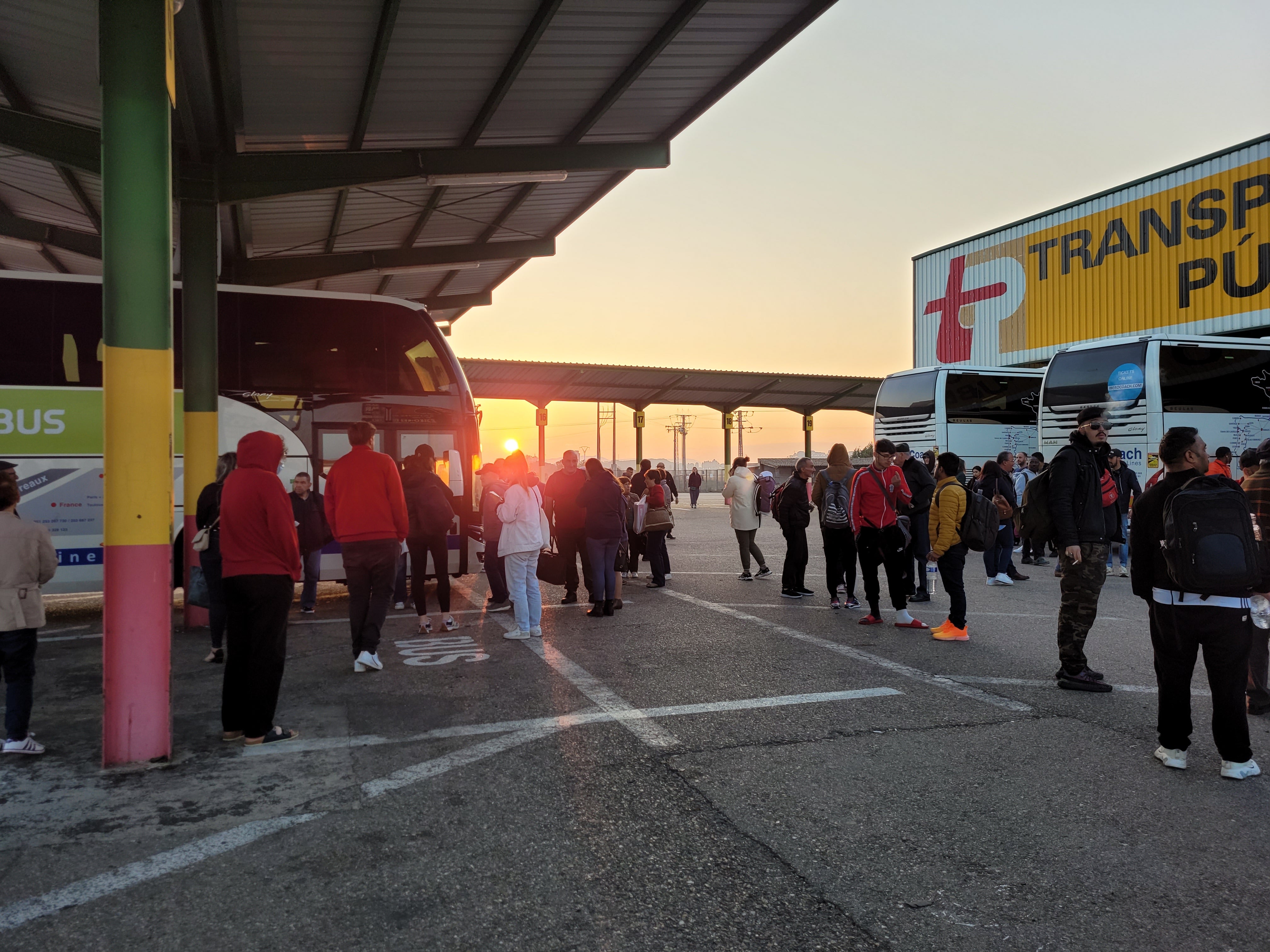
Despite it all, we pulled into Algeciras on time at 8.30pm, a mere 46 hours and 15 minutes after I had set off from London. I was alive. I didn’t appear to be mentally traumatised. And I hadn’t had to sell a kidney to get there. Result!
Train
Total time: 20 hours (excluding an overnight stay in Madrid)
Route: Algeciras-Madrid-Barcelona-Paris-London
Cost: From £236
Comfort: 8/10
I used widely popular train aggregator app The Trainline to book my tickets for the considerably shorter journey home. Yes, you have to pay a small booking fee – but, personally, I think the ease of having all my train tickets in one place rather than having to pull up five individual emails is worth paying for.
Now, there is this to say: although clearly more convenient, travelling by train on this route does necessitate a stopover somewhere, no matter how you slice it. There were no sleeper trains timed to enable me to keep going overnight; so the traveller has to factor in extra cash for a night’s accommodation, plus the extra time of staying still instead of being consistently on the move.
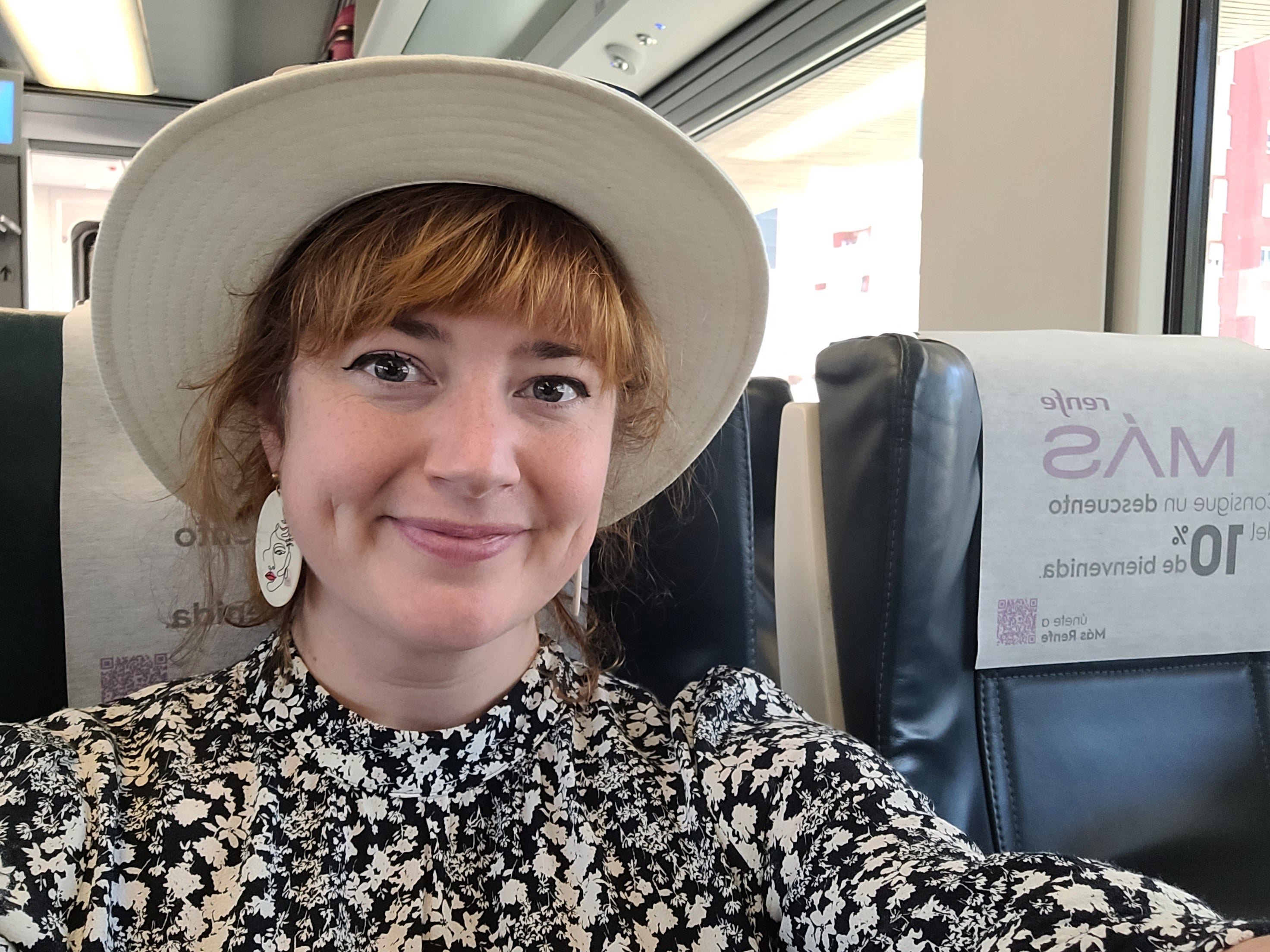
I opted to do the first leg, Algeciras to Madrid (5h 37m), and then spend two nights and a full day in the Spanish capital to make the most of it – an utterly enjoyable experience that was well worth adding on. If I’d skipped the mini city break element, the quickest time I could have completed the entire Algeciras-London journey in would have been 30h 30m, including the requisite overnight stop – although this would still have been a clear 15-plus hours fewer than my coach odyssey. The actual total time spent on trains (and connections) was more like 20 hours.
Well, I don’t think anyone will be shocked to hear that travelling by rail is far more comfortable than by coach. The Algeciras-Madrid train, a service from Spanish operator Renfe, had generously sized seats, wide tray tables, ample space for luggage and perfect-temperature air con. The only thing for travellers to take note of is that arriving early is recommended; despite this being a domestic train, luggage had to be put through a security scanner and passports flashed at the gate.
I don’t think anyone will be shocked to hear that travelling by rail is far more comfortable than by coach
After my whirlwind tour of Madrid, I chose to complete the rest of my route home in one single, train-packed day lasting 14h 25m. It started early, with a 7.05am train from Madrid to Barcelona on low-cost operator Ouigo, whizzing me there in just 2h 45m. Next, I picked up the high-speed TGV INOUI service that slices up through Spain and France, all the way to Paris Gare de Lyon, in 6h 48m. There was ample time to cross to the Gare du Nord on the Metro, before my Eurostar from the French capital to London’s St Pancras station (a respectable 2h 17m).
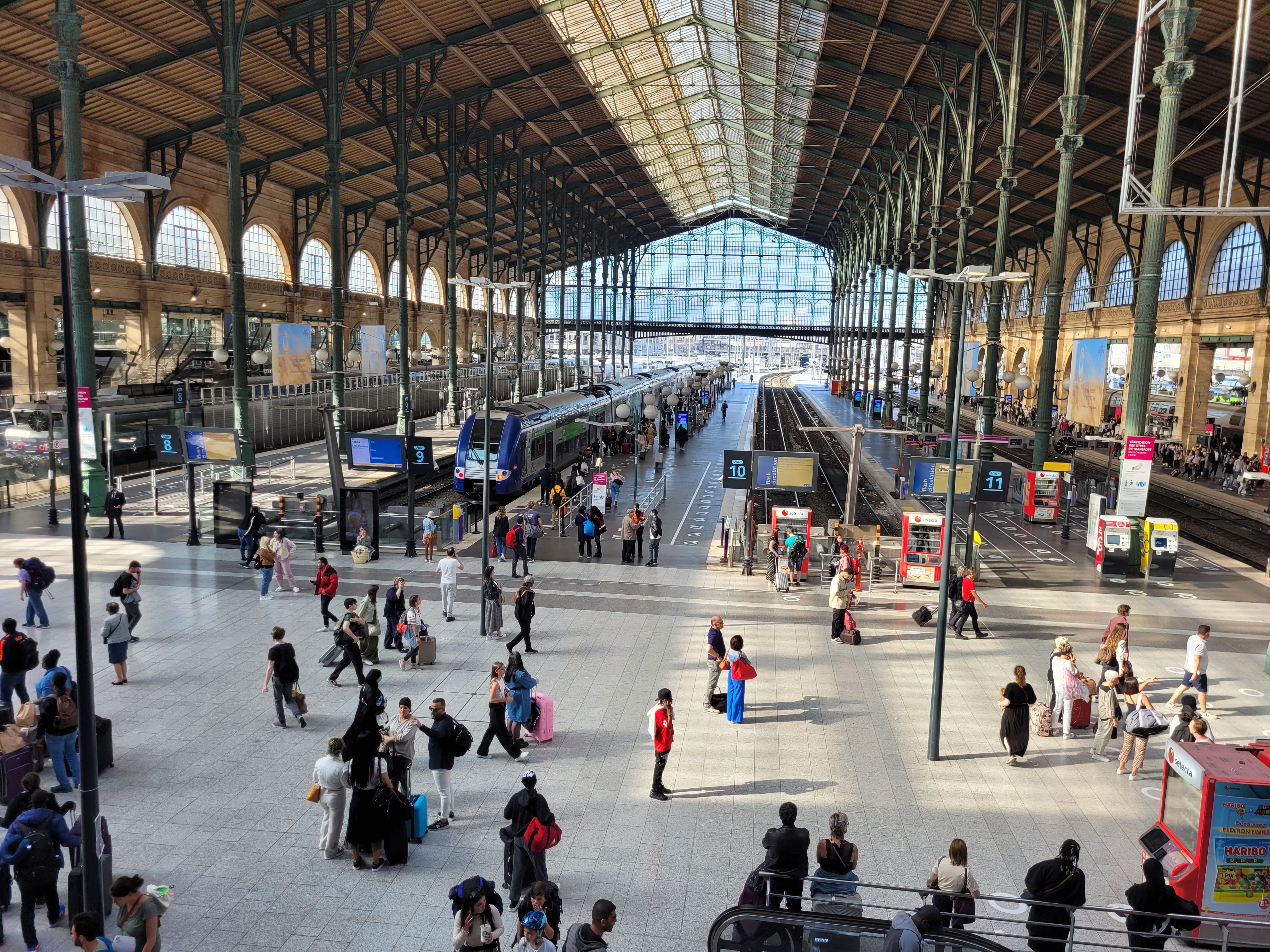
Perhaps I got lucky; not only did every leg of the journey run on time, but all my trains boasted comfy seats, tables, more-than-adequate legroom, plug sockets and free wifi. On the double-decker Barcelona-Paris train, the airy dining car had places to sit and proper, passable food: I tucked into a warmed quiche with genuinely buttery, flaky pastry – quite the feat while rattling along at up to 186mph.
In fact, I even managed to catch a final connecting train from St Pancras back home to Folkestone, and was tucked up in bed by 10.30pm. Not bad for a day’s work.
The conclusion
Pros and cons-wise, it pretty much comes down to cold, hard cash. If you’re looking to travel in more comfort, plus an environment where you could feasibly work on the move – and quite fancy breaking up the journey with an overnight stay somewhere cool – rail travel is the obvious choice. But many of us make decisions based on money, or lack thereof; the coach journey was £124 cheaper. Factor in accommodation in Madrid – around £65 for a three-star hotel – and that’s a saving of £189 one way. For a return journey, that’s a not-at-all-insignificant £378.
So there you have it: I know which I’d choose if money was no object; but money clearly is an object for all but the wealthiest traveller. Whichever way you decide to go, I’d still highly recommend taking the long way round – if nothing else, it makes for a great ice breaker at a wedding.
Read more of our best Spain hotel reviews
Join our commenting forum
Join thought-provoking conversations, follow other Independent readers and see their replies
Comments